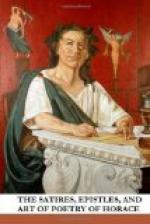BOOK I.
SATIRE I.
QUI fit, Maecenas.
How comes it, say, Maecenas, if you can,
That none will live like a contented man
Where choice or chance directs, but each must praise
The folk who pass through life by other ways?
“Those lucky merchants!” cries the soldier
stout,
When years of toil have well-nigh worn him out:
What says the merchant, tossing o’er the brine?
“Yon soldier’s lot is happier, sure, than
mine:
One short, sharp shock, and presto! all is done:
Death in an instant comes, or victory’s won.”
The lawyer lauds the farmer, when a knock
Disturbs his sleep at crowing of the cock:
The farmer, dragged to town on business, swears
That only citizens are free from cares.
I need not run through all: so long the list,
Fabius himself would weary and desist:
So take in brief my meaning: just suppose
Some God should come, and with their wishes close:
“See, here am I, come down of my mere grace
To right you: soldier, take the merchant’s
place!
You, counsellor, the farmer’s! go your way,
One here, one there! None stirring? all say nay?
How now? you won’t be happy when you may.”
Now, after this, would Jove be aught to blame
If with both cheeks he burst into a flame,
And vowed, when next they pray, they shall not find
His temper easy, or his ear inclined?
Well, not to treat things lightly (though, for me,
Why truth may not be gay, I cannot see:
Just as, we know, judicious teachers coax
With sugar-plum or cake their little folks
To learn their alphabet):—still, we will
try
A graver tone, and lay our joking by.
The man that with his plough subdues the land,
The soldier stout, the vintner sly and bland,
The venturous sons of ocean, all declare
That with one view the toils of life they bear,
When age has come, and labour has amassed
Enough to live on, to retire at last:
E’en so the ant (for no bad pattern she),
That tiny type of giant industry,
Drags grain by grain, and adds it to the sum
Of her full heap, foreseeing cold to come:
Yet she, when winter turns the year to chill,
Stirs not an inch beyond her mounded hill,
But lives upon her savings: you, more bold,




